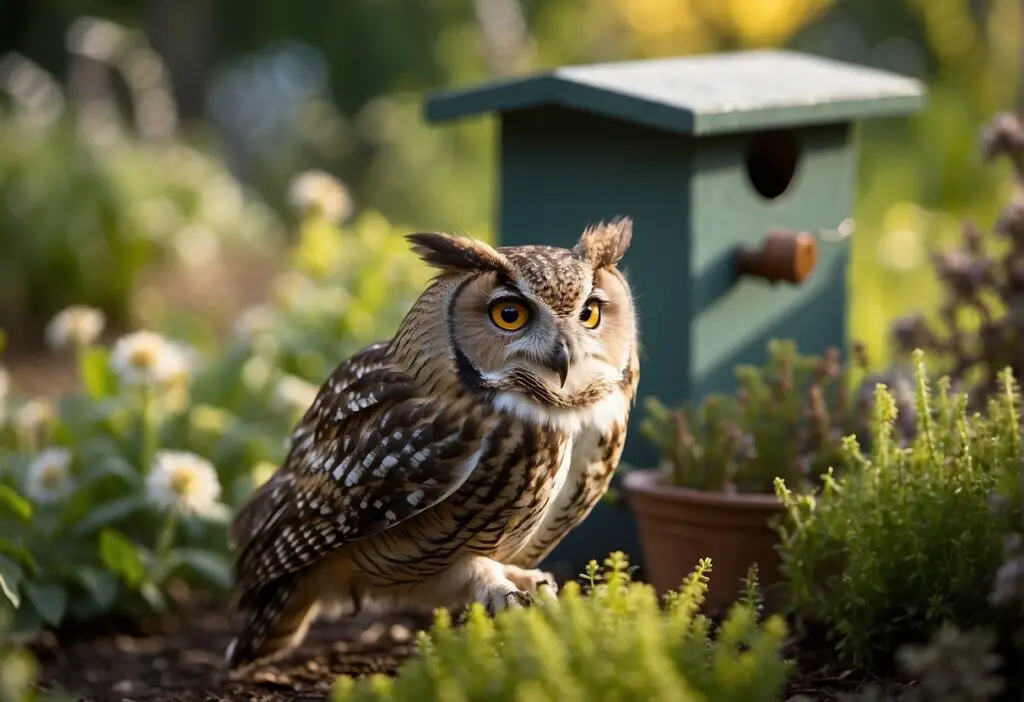As you become more conscious of the environment and sustainability, finding harmonious ways to coexist with nature is important.
Adopting an eco-friendly approach to life even extends to how you deal with unwelcome guests like rodents. Natural rodent control solutions offer a safe method of keeping your home pest-free without compromising your well-being or the health of the planet.

Dealing with rodents can be a nuisance, but it doesn’t have to be at the expense of the environment. By seeking out natural alternatives to chemical repellents, you can deter these pesky creatures effectively and ethically. These environmentally friendly options are not only better for the Earth, but they also keep your living space safe for you, your family, and your pets.
Understanding Rodent Behavior

Before you tackle rodent control, it’s essential for you to understand why rodents may be attracted to your home and how to recognize their presence.
Factors Attracting Rodents to Homes
Food Sources: Rodents, such as rats and mice, are primarily drawn to areas with easy access to food. Your kitchen, with crumbs and accessible pantry items, can be a gourmet feast for these critters. Store food in sealed containers and keep your spaces clean to reduce the allure.
Entry Points: These animals are skilled at finding entry points into your house, which can include openings as small as a dime. Common entry points are cracks in walls, gaps around windows or doors, and even utility line openings. Ensure these are sealed to deter rodents.
Nesting Sites: Warmth and shelter are what rodents seek for nesting sites. Areas like attics, basements, and behind walls provide perfect spots for them to settle down. Regularly inspect these areas, clearing clutter and sealing off any potential nesting sites.
Common Signs of a Rodent Problem
-
Gnaw Marks: Tiny gnaw marks on food packaging, furniture, or wires are telltale signs of rodents. These marks often indicate an attempt to access food or create nesting material.
-
Droppings: Finding rodent droppings, especially around food sources or cluttered areas, is a significant indication that you have unwanted guests. Droppings are typically small, dark, and shaped like a pellet.
Remember to check for these signs regularly and take action promptly if you notice them, as a small problem can quickly escalate to a serious infestation.
Preventative Strategies for Rodent Control
When dealing with rodents, prevention is key. Focus on making your home less inviting to these critters will save you a great deal of trouble. Let’s explore how you can secure your home against unwelcome guests and use natural methods to keep them away.
Securing the Home Against Entry
Your first line of defense against rodents is to ensure they have no way into your home. Inspect the exterior of your home for any gaps or openings, and consider following these steps:
- Seal cracks and holes on the outside of the home using caulk, steel wool, or a combination of both. Pay special attention to areas where utilities and pipes enter the home.
- Replace loose mortar and weather stripping around the basement foundation and windows.
- Install good-quality door sweeps on exterior doors to keep rodents from entering underneath.
Remember, rats can squeeze through a hole as small as a quarter, and mice can fit through gaps as small as a dime!
Natural Repellents and Deterrents
Employing natural repellents and deterrents is a safe and non-toxic way to complement the physical barriers you’ve established. Here are some effective options:
- Peppermint oil: Soak cotton balls in peppermint oil and place them in areas where rodents are likely to enter. Rodents dislike the strong scent and will avoid the area.
- Eucalyptus or citronella oil: Similar to peppermint, these oils can deter rodents when applied around potential entry points.
- Ultrasonic devices: These emit a sound that is unpleasant to rodents but inaudible to humans, helping to keep them at bay.
Regular cleaning and reducing clutter around your home also play a crucial role in habitat modification, making the environment less appealing to rodents. Maintain a clean kitchen, store food in airtight containers, and manage your trash effectively to reduce the attraction for these pests.
Natural Rodent Repellent Options
Exploring natural solutions can help you manage rodent problems in an eco-friendly way. In this section, we’ll look at how essential oils, herbs, and natural predators can be clever allies in your quest for a rodent-free space.
Essential Oils and Herbs as Repellents
Rodents have a keen sense of smell, which is why aromatic compounds found in certain plants can be incredibly effective in deterring them. Peppermint oil, a strong scent that rodents dislike, can be applied using soaked cotton balls in areas they frequent. Remember to replace them every few weeks to keep rodents at bay. Similarly, eucalyptus and mint are known for their potent scents and can also help in keeping your home pest-free.
Incorporating plants like marigolds, garlic, and daffodils into your garden can act as natural repellents. Their natural odors and compounds serve as a deterrent, creating a protective barrier that lessens the likelihood of a rodent invasion.
Using Predators to Control Rodent Populations
Natural predators offer an environmentally friendly way to balance rodent populations. Owning a cat, for example, can dramatically decrease the presence of rodents. Cats are natural hunters and often chase away or catch mice and rats.
Barn owls are another effective predator in controlling rodent populations. Encouraging these majestic birds to patrol your property can be as simple as installing an owl box. Barn owls are known for their appetite for rodents and can consume large numbers, offering a natural and appreciable pest control service.
Humane and Eco-Friendly Trapping
When you’re looking to control a rodent problem in a way that’s kind to both the environment and the animals, humane and eco-friendly traps are your go-to solutions. They are specifically designed to catch rodents without causing them unnecessary harm or introducing toxins to your home and the Earth.
Types of Non-Toxic Traps
Live Traps: These traps are engineered to capture rodents alive, allowing for their release back into the wild at a safe distance from your home. Live traps usually come in the form of cages or boxes, equipped with a trigger-activated door that closes once the rodent enters to access the bait.
- Examples of live traps include:
- Wire mesh cages
- Box-type traps with a see-through top for easy monitoring
Snap Traps: Whilst traditionally considered to be harmful, there are now more humane variations of snap traps that are designed to be quick and as painless as possible. When using snap traps, it’s vital that you choose ones with a sensitivity mechanism to prevent injuring small or unintended animals.
- Features to look for in snap traps:
- Sensitive trigger to reduce harm
- Non-toxic materials like wood or metal
Effective Use of Humane Traps
To ensure both safety and effectiveness when using these traps, placement and baiting are key. You need to place traps near signs of rodent activity, like droppings or entry holes, and out of the way of pets and children.
- For effective trapping:
- Check live traps daily to minimize stress on captured animals
- Use appealing bait like peanut butter or seeds
- Wear gloves when handling traps to prevent your scent from deterring rodents
Remember, while non-toxic traps are safer for everyone involved, always use caution when handling any type of trap to maintain your safety and the safety of the rodents you’re capturing.
Maintenance and Follow-Up Actions

Once you’ve implemented natural rodent control methods, it’s important to maintain them to ensure long-term effectiveness. Here are the key maintenance and follow-up actions to keep your home rodent-free.
Regular Home Inspections and Cleanliness
Regular Inspections: Make it a habit to inspect your home for signs of rodents. Check for droppings, gnaw marks, and sounds of movement. Seal any gaps or cracks with materials like steel wool or copper mesh to prevent new rodents from entering. For more guidance, check out natural predator strategies.
Clean Up: Maintain cleanliness by securely storing food and disposing of waste promptly. Remove potential rodent shelters near your home, and keep your garden tidy. Implementing these sanitation tactics can greatly reduce food sources and nesting sites for rodents.
Addressing Recurrence and Continued Prevention
Integrated Pest Management (IPM): Utilize IPM strategies to address any recurrence of rodent activity. This includes monitoring for pests, identifying points of entry, and using non-toxic repellents. Consider deterrents like peppermint oil for a safe and natural approach.
Continual Prevention: Stay diligent with your rodent control efforts. Your ongoing commitment to these steps is crucial for preventing future infestations. Remember to refresh natural repellents regularly and adjust your approach based on seasonal changes and any signs of rodent activity.
How do the costs of eco-friendly rodent control methods compare to traditional pest control services?
The cost of eco-friendly rodent control methods can vary, but they are often seen as cost-effective in the long term, especially when considering the potential health and environmental benefits. However, professional pest control services might offer more immediate results, though at a higher financial and environmental cost.
Are there any long-term studies on the effectiveness of natural rodent control methods compared to chemical methods?
Regarding long-term studies comparing the effectiveness of natural versus chemical rodent control methods, while specific studies were not mentioned, it’s understood that eco-friendly methods are gaining popularity for their sustainability and safety, though effectiveness can vary based on implementation and the severity of the infestation.
Can natural rodent repellents like essential oils and herbs cause any adverse effects on certain pets or plants?
Natural rodent repellents, such as essential oils and herbs, are generally safe for use around pets and plants, but it’s crucial to research and use them correctly. Some substances can be harmful if ingested by pets or applied directly to plants in high concentrations. Always check for any specific precautions related to the natural products you intend to use.



